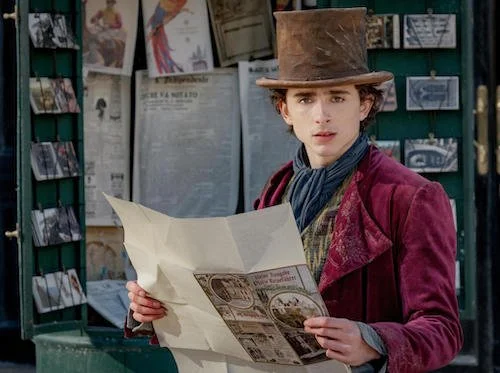Wonka
Written by Andreas Babiolakis
I was at least curious about Paul King’s Wonka — a prequel to Roald Dahl’s Charlie and the Chocolate Factory story and the two film adaptations that followed, including the Gene Wilder-starring one — because of how strong both of his Paddington films are (the second, in particular, is a tremendous family film that surpasses any expectations I, or anyone else, had for it). King has a knack for making films that are child friendly and still take young audiences very seriously (without dumbing down the story or content to the point of condescending ridicule); in that same breath, his family pictures also have serious political commentary in them that intrigue older viewers (like immigration and racism in Paddington, and wrongful incarcerations in Paddington 2). His films are easy to watch no matter who you are. Wonka is the same way. While it isn’t quite on the level of either of the Peruvian bear films, Wonka is still a solid delight full of catchy tunes, decadent charisma, and more social commentary (this time, King’s targeting the uphill battle of smaller businesses competing with ruthless corporations).
Willy Wonka (Timothée Chalamet) travels to some vague place in Europe to sell chocolates in honour of his late mother. He attracts the attention of the entire public, including Chocolate Cartel members (yes, that is a thing) Arthur Slugworth, Gerald Prodnose, and Felix Fickelgruber. They don’t want their monopoly to be threatened in any way, so the first move is to rid the city of Wonka and his confectionary inventions. Meanwhile, Wonka is staying at Mrs. Scrubitt’s laundrette, and he gets dinged by the fine print of the contract he signs to rent a room out there. He’s now legally bound to the laundrette as a slave — alongside other poor souls — for years. Yikes. Wonka makes the most of his situations by pushing harder on his chocolate recipes. His perseverance and optimism are both major qualities of his character and the film's tone overall. You know everything’s going to be okay since, well, this is a prequel and we know that Wonka will wind up with his own chocolate factory someday (even though King does make some deviations from Dahl’s original story, including the original way Wonka came across those Oompa Loompas). King presses the tribulations of Wonka far enough to make us believe — even for a split second — that a legitimate danger could threaten Wonka’s dream. We know he’ll be okay, but he still feels tested.
Wonka skews a little too much in its favour to get by, but it is still a magically fun time.
As Wonka gets going, it does one thing quite well: setting up its story. You can spot all of its layers quite early, and there are even some twists and turns (albeit some obvious ones as well) for you to nibble on. The problem is that Wonka doesn’t treat its resolutions quite as preparedly as its buildups, with the tumultuous climax saved by illogical miracles that really don’t have a place in a film that otherwise feels so methodically thought out (without spoiling too much, how does [redacted] know where [redacted] are, what’s going on, and how to save them? There is no way that this makes sense, and this is just one of a few plot holes evident here). You may think it’s stupid to pick apart a children’s film, but the best kinds are the ones that are well made and treat these audiences with the same respect that we adults get from great films. Besides, this is Paul King we’re talking about. His previous two efforts are quite solid (with Paddington 2 being beyond thorough in its design), so it’s not like this director isn’t capable of airtight writing in films full of wonder and imagination. Magic for the sake of magic is never a good enough solution in writing, and Wonka gets a wee bit carried away with its whimsy.
Nonetheless, outside of that one major complaint, it’s actually refreshing to announce how fun and lovely Wonka is. The songs range from quite good to infectious. Chalamet mostly feels like a fascinating and magnetic Willy Wonka, and any moments where he doesn’t feel more like a case of picking the wrong take for a scene than his ineptitude (these moments are brief and few and far between). The quest to open a chocolate store and revive a departed loved one’s dreams may be way off from Dahl’s original intentions, but separate yourself from nostalgia and it’s actually a tender way of going about things (this also makes Wonka feel like the right kind of film to watch this holiday season, given its strategic release date). Wonka is a wonderland of songs, dancing, and delicious delights for children, but it is at least intriguing enough for adults given the occasional risky joke and the worthwhile approach to bringing up classist issues (or “greedy” winning before the “needy” in society); it’s an important lesson for kids to see (and Willy Wonka’s triumph over adversity, especially) as well.
The main thing is that this may be a one-watch-and-done-deal situation for adults where they may not revisit the film ever again. Having said that, I can honestly imagine kids gravitating towards this as a favourite of theirs. It possesses that certain likability and wonder to matter to children. With that, I suggest that parents get ready to hear these songs again and again. Wonka does enough to keep up with the high expectations and the quality of its predecessors. It won’t act as a replacement for those who already have their favourite version of Willy Wonka and his affiliated film. However, I think this will be an impressionable watch for the young viewers who have never had a Wonka experience before; this will win in their eyes. Wonka overall is harmless to watch, and it may also wow you more than you thought it would. It’s a loving homage, a strong-enough variant that stands on its own, and a heartwarming treat to close out the year.
Andreas Babiolakis has a Masters degree in Film and Photography Preservation and Collections Management from Toronto Metropolitan University, as well as a Bachelors degree in Cinema Studies from York University. His favourite times of year are the Criterion Collection flash sales and the annual Toronto International Film Festival.






